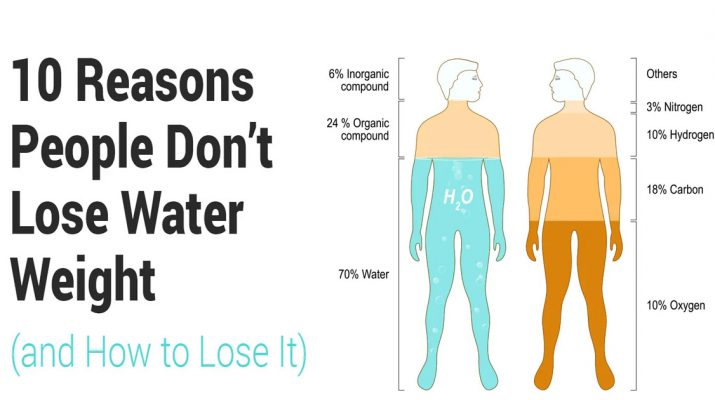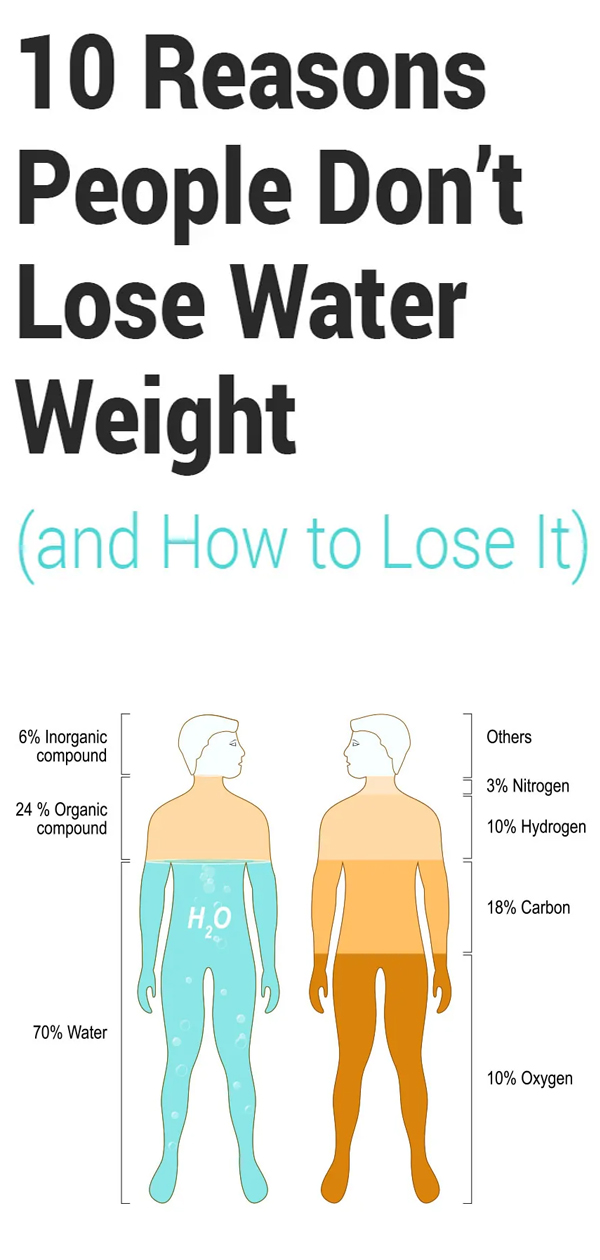The human body is made up of between 50 and 60 percent water. When this percentage exceeds this range, it’s called “water weight.”
Water weight is extremely common and is, more often than not, no cause for concern. Water weight can, however, feel uncomfortable and unwelcome while causing or worsening symptoms such as bloating or puffiness.
In this article, we’re going to talk about more about water weight and how to lose it. We’ll also get into some really interesting facts about H2O. Let’s do this!
If we’re honest, most will agree that water is one of those things we don’t think too much about until we’re thirsty. (Hey, we’re surrounded by the stuff!) But here are some fascinating facts about water that you may not know:
H2O: Interesting Factoids
We’ve already mentioned that water makes up as much as 60 percent of a person’s total weight. Here are some other interesting facts about water:
- We can live for about a month without food, but only one week without water.
- Our brain is made up of 75 percent water (which happens to be the same percentage of H2O in a tree!)
- The Earth contains “the same amount” of water now as when the Earth came into existence.
- 99 percent of the Earth’s water is undrinkable. 97 percent is salt water, and the other 2 percent makes up glaciers and ice caps.
- The average water usage per home in the U.S. is 50 gallons.
- Ice is lighter than water, which allows it to float. Why is it lighter? H2O expands by about 9 percent when frozen.
- The amount of water on the Earth’s surface is the same as when the Earth was first formed. (EPA: “The water from your faucet could contain molecules that dinosaurs drank.)
- While many of us take it for granted, there are currently 780 million people without access to a water source.
Water In The Human Body
Water is, without a doubt, the most essential substance on Earth. All living beings, human and non-human, require water to function. So why is it that 80 percent of us report not drinking enough? Maybe we simply need to be reminded as to the critical nature of water. Lucky day! Here are ten everyday functions that water performs.
Without Water, We’D Die.
Pretty straightforward, eh? But ask yourself this question: if the lack of water will incite the dying process, what do you think happens when we’re chronically under-hydrated? Nothing good.
Water Keeps Weight In Check.
Yes, this article is about shedding water weight, but that doesn’t mean you should be ignorant of another “benny” of drinking the clear stuff: weight loss. The body is actually quite bad at distinguishing between hunger and thirst. Therefore, drinking more H2O may be just what the body needs. Moreover, water is critical for the functioning of the metabolic system – and we all how important that is to weight loss!
Water Boosts Mood.
In a 30-person study published in the journal Perceptual and Motor Skills, college athletes assigned to a “dehydration group” tested for “negative mood, including fatigue and confusion,” compared to the other research groups. Do we really need a study to tell us that water – or the lack of – influences how we feel? We shouldn’t, but there ya go!
Water Enhances Physical Performance.
Whether you’re a gym rat or a couch surfer, increasing water intake improves muscle tissue performance. If you’re in the latter group, you’ll probably notice these benefits a “tad” less often.
Water Lubricates Our Joints.
H2O works to keep our bone cartilage flexible and soft. Glucosamine, a popular nutritional supplement among the elderly and physically active, works to reduce joint pain by increasing the tissues’ absorption of water.
Water Prevents Cancer.
Multiple studies show that proper hydration is linked to a lower risk of various cancer types, including the bladder, breast, and colon. Experts hypothesize that dehydration interferes with the cells’ ability to remove waste, including carcinogens, as the reason for this link.
Water Improves Skin Appearance
What is the largest organ of the body? The skin. Proper water consumption is critical to skin cell development, growth, and health. Appearance-wise, water (and sweat) is the skin’s source of moisture; and regular consumption of water is the best way to keep your skin looking healthy and youthful.
Water Carries Oxygen To The Body
The blood is made up of about 90 percent water. One of the critical things that blood does is deliver the oxygen contained in H2O to every square inch of the body. The high water concentration in blood is also crucial for regulating blood pressure.
Water Safeguards The Kidneys
Our kidneys perform some of the most crucial functions in the body. They clean the blood, process waste to be passed as urine, and help maintain the body’s overall fluid balance.
Water Supports The Digestive System
Actually, water makes digestion possible. Without water, there is no saliva, no lubrication of the esophagus, no dissolution of food, and so on. It makes sense, then, that inadequate water intake can lead to digestive problems like constipation, heartburn, and stomach ulcers.
What Is Water Weight?
As mentioned, the human body is made up of between 50 and 60 percent water. Any time that this ratio is exceeded, the body accumulates “water weight.” Water weight is extremely common and is, more often than not, no cause for concern.
Water weight can, however, feel uncomfortable and unwelcome while causing or worsening symptoms such as bloating or puffiness. Water weight that causes severe complications is referred to as edema in the medical community.
10 Reasons Why People Don’t Lose Water Weight (And How To Lose It)
Here are 10 reasons why people don’t lose water weight, followed by actionable steps for reducing this weight.
1. You’Re Going Heavy On The Salt
Too much sodium throws our fluid balance out of whack. As mentioned, our blood is mostly water – about 90 percent. When much sodium can accumulates in the blood, it demands additional water sources from other areas of the body to compensate.
How to Lose it: You won’t get any “cut out the salt” advice here. The truth is that sodium plays critical roles in the absorption of nutrients, maintenance of cognition function, and in the working of the nerves and muscles. The American Heart Association (AHA) recommends an “ideal limit” of “no more than 1,500 milligrams (mg) per day for most adults.”
2. Too Many Carbs
Refined carbohydrates (e.g., bread, white rice, flour, etc.) effectively turn into sugar when digested by converting into glycogen. This glycogen is then stored in the muscle which, says experts, causes the body to hold onto about three times as much water.
How to Lose it: Reduce your refined carb intake and eat more fruits and vegetables. Stay away from food items like doughnuts, bagels, white bread, flour, and sugary stuff.
3. Too Much Sitting
A sedentary lifestyle, which includes office jobs that require little movement, contributes to retaining water. Physical activity is needed for proper blood circulation, the lack of which can cause fluid to accumulate in the lower extremities – a telltale sign of water retention.
How to lose it: Get moving. Even light exercise such as a leisurely walk can make all the difference. Commit to getting at least half an hour of exercise daily.
4. Too Little Potassium
Potassium is a vital nutrient for promoting and maintaining fluid balance. Per a study out of Northwestern University, potassium also works to counteract the water misappropriation qualities of sodium in the blood.
How to lose it: Eat the recommended daily intake (RDI) of potassium, which is 4,700 mg. Foods rich in the nutrients include avocados, bananas, spinach, and tomatoes.
5. Not Enough Fiber
Fiber is an essential component of a properly functioning digestive system. Relatedly, an important part of shedding excess water weight is healthy digestion.
How to lose it: Eat the RDI for fiber – 25 mg for women and 38 mg for men. Foods high in fiber include fruit, grains, legumes, and vegetables.
6. Not Enough Water
This one makes sense when you consider that the body will hold onto water when we’re not ingesting enough – a survival mechanism of the body. Therefore, regular and consistent water intake is an integrated part of maintaining proper fluid balance.
How to lose it: The National Academics of Sciences, Engineering, and Medicine found that an adequate daily intake of water is 15.5 cups (120 ounces) for men and 11.5 cups (92 ounces) for women.
7. It’S About “That Time.”
The menstrual cycle (period) requires a surge of hormones that cause the female body to retain more water. It’s not unusual for women to gain up to ten pounds of water weight in the week leading up to their period.
How to lose it: Not much can be done here, as water retention is a natural part of the pre-menstruation process. However, abstaining from things like salty foods, alcohol, and too much caffeine, along with proper hydration, can help.
8. Too Much Booze
Alcohol is a major diuretic, causing water retention levels to rise. Certain specialty drinks that contain things like juice, soda, etc. contain added sugar – a refined carbohydrate – as well. Many beers also contain high amounts of carbs.
How to lose it: Simple. Stay away from the booze and beer. If you must drink, choose a light beer or drink a glass of water for every serving of alcohol.
9. Too Much Junk Food
Junk food includes any food that is not home-cooked. Fast food is the main culprit, along with easy grab-and-g0 items like candy bars. Yes, this includes many – if not most – bagged, boxed, and frozen food items in the market.
How to lose it: Again, stay away from it. Abstaining from all junk food requires a bit of discipline and knowledge, but it’s certainly possible. Learn how to cook at least a couple of meals at home.
10. An Underlying Condition
Edema is swelling caused by an overconcentration of water within the body’s tissues. The most commonly affected areas are the ankles, arms, feet, hands, and legs. Edema is often the result of medication, pregnancy, or an undiagnosed medical condition such as cirrhosis of the liver, congestive heart failure, and kidney disease. Symptoms of edema often include difficulty breathing, chest pain, and shortness of breath.
How to lose it: If water retention does not go away, see a doctor. Many health conditions can be treated if found out in the earlier stages. Make sure to see a physician at least once per year for a routine physical examination.


